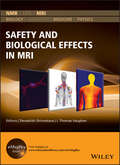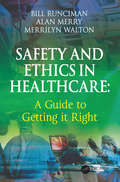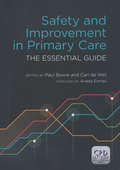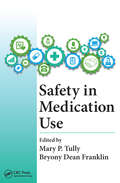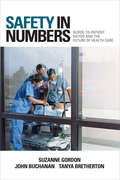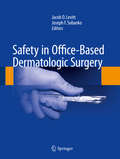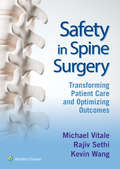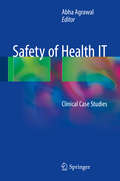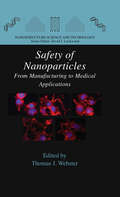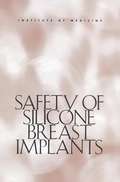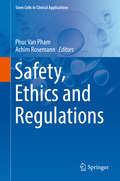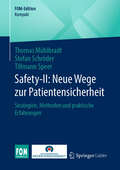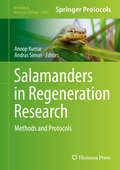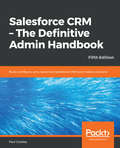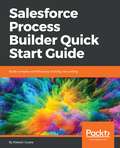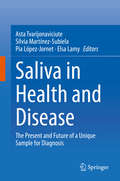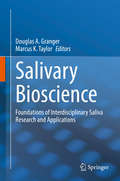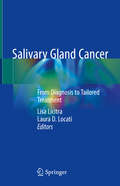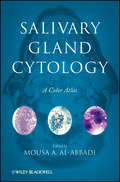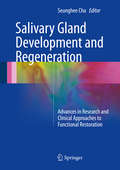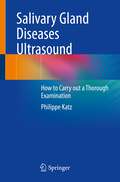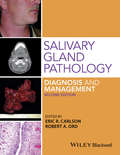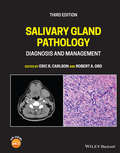- Table View
- List View
Safety and Biological Effects in MRI (eMagRes Books)
by J. Thomas Vaughan Devashish ShrivastavaIn vivo magnetic resonance imaging (MRI) has evolved into a versatile and critical, if not ‘gold standard’, imaging tool with applications ranging from the physical sciences to the clinical ‘-ology’. In addition, there is a vast amount of accumulated but unpublished inside knowledge on what is needed to perform a safe, in vivo MRI. The goal of this comprehensive text, written by an outstanding group of world experts, is to present information about the effect of the MRI environment on the human body, and tools and methods to quantify such effects. By presenting such information all in one place, the expectation is that this book will help everyone interested in the Safety and Biological Effects in MRI find relevant information relatively quickly and know where we stand as a community. The information is expected to improve patient safety in the MR scanners of today, and facilitate developing faster, more powerful, yet safer MR scanners of tomorrow. This book is arranged in three sections. The first, named ‘Static and Gradient Fields’ (Chapters 1-9), presents the effects of static magnetic field and the gradients of magnetic field, in time and space, on the human body. The second section, named ‘Radiofrequency Fields’ (Chapters 10-30), presents ways to quantify radiofrequency (RF) field induced heating in patients undergoing MRI. The effect of the three fields of MRI environment (i.e. Static Magnetic Field, Time-varying Gradient Magnetic Field, and RF Field) on medical devices, that may be carried into the environment with patients, is also included. Finally, the third section, named ‘Engineering’ (chapters 31-35), presents the basic background engineering information regarding the equipment (i.e. superconducting magnets, gradient coils, and RF coils) that produce the Static Magnetic Field, Time-varying Gradient Magnetic Field, and RF Field. The book is intended for undergraduate and post-graduate students, engineers, physicists, biologists, clinicians, MR technologists, other healthcare professionals, and everyone else who might be interested in looking into the role of MRI environment on patient safety, as well as those just wishing to update their knowledge of the state of MRI safety. Those, who are learning about MRI or training in magnetic resonance in medicine, will find the book a useful compendium of the current state of the art of the field.
Safety and Ethics in Healthcare: A Guide To Getting It Right
by Alan Merry Bill Runciman Merrilyn WaltonAs more and more people survive into old age, the burden of caring for them becomes greater and greater. Although it is now possible to alleviate many of the afflictions that beset mankind, no society can afford to pay for all the healthcare that is now available or technically possible. People working in healthcare increasingly have to do more with less. Rationing takes many forms, mostly covert, and the less privileged in most societies end up struggling to get their proper share of the available healthcare resources. All too often, those in the front-line have to deal with the consequences of this 'rationing by default': healthcare professionals find themselves rushed off their feet simply doing the basic tasks and completing all the paperwork; placing frail, sick people in ever lengthening queues, sometimes asking them to wait for hours in the middle of the night under uncomfortable and even unsafe conditions; and, worst of all, working under conditions they would rather avoid in which the safety margin for those they are caring for has been greatly diminished. We are all aware that under these conditions the chance of making a mistake which can seriously harm or even lead to the death of a patient is greatly increased. But what can be done about this? How can you be sure that you are doing the right thing when faced with having to practise an uncertain science on vulnerable patients in a complex system under ever-changing conditions? At what point could you cross the invisible line from reasonable to irresponsible or unethical behaviour by tolerating conditions or tacitly accepting practices which may be regarded as unacceptable, even though you may have little immediate control over them? This book is a guide to getting it right for healthcare professionals. It is about doing the right thing, in the right way, at the right time, for the right people. These are the dimensions of quality in healthcare, and although some are in conflict (equitable access and efficiency, for example), adherence to ethical practice and professional behaviour will help lead healthcare practitioners through the minefield of responsibilities and priorities. Real-life situations are integral to the book, with over 500 clinical examples referred to within the text.
Safety and Improvement in Primary Care: The Essential Guide
by Paul BowieIn recent decades most of the international effort given over to studying and improving the safety of patient care has been focused in acute hospital settings. To some extent this was always something of a puzzle to those of us with a direct interest in this important issue...Now, however, the tide is slowly turning. Policymakers, healthcare leader
Safety and Security Science and Technology: Perspectives from Practice (Advanced Sciences and Technologies for Security Applications)
by Anthony J. MasysGlobal security threats have created a complex risk landscape that is challenging and transforming society. These global security issues intersect and influence the political, economic, social, technological, ecological and legal dimensions of the complex risk landscape and are now transborder thereby becoming national security issues. Accessing the innovation space to support safety, security and defence capabilities is critical in order to mitigate new and evolving threats.Through real-world examples of innovation, this book provides a detailed examination of the innovation space as it pertains to the application of S&T to safety and security threats and challenges. This book is of most interest to public and private sector innovators as well as academician and graduate students working in the safety and security domain.
Safety in Medication Use
by Bryony Dean Franklin Mary P. TullyAn estimated 1 in 20 patients are admitted to the hospital due to problems with their medication and 1 in 100 hospitalized patients are harmed due to medication errors during their stay. The prescribing of medications is the most common health care intervention and medication safety is relevant to all health care professionals and patients, in all
Safety in Numbers
by Suzanne Gordon John Buchanan Tanya BrethertonLegally mandated nurse-to-patient ratios are one of the most controversial topics in health care today. Ratio advocates believe that minimum staffing levels are essential for quality care, better working conditions, and higher rates of RN recruitment and retention that would alleviate the current global nursing shortage. Opponents claim that ratios will unfairly burden hospital budgets, while reducing management flexibility in addressing patient needs. Safety in Numbers is the first book to examine the arguments for and against ratios. Utilizing survey data, interviews, and other original research, Suzanne Gordon, John Buchanan, and Tanya Bretherton weigh the cost, benefits, and effectiveness of ratios in California and the state of Victoria in Australia, the two places where RN staffing levels have been mandated the longest. They show how hospital cost cutting and layoffs in the 1990s created larger workloads and deteriorating conditions for both nurses and their patients-leading nursing organizations to embrace staffing level regulation. The authors provide an in-depth account of the difficult but ultimately successful campaigns waged by nurses and their allies to win mandated ratios. Safety in Numbers then reports on how nurses, hospital administrators, and health care policymakers handled ratio implementation. With at least fourteen states in the United States and several other countries now considering staffing level regulation, this balanced assessment of the impact of ratios on patient outcomes and RN job performance and satisfaction could not be timelier. The authors' history and analysis of the nurse-to-patient ratios debate will be welcomed as an invaluable guide for patient advocates, nurses, health care managers, public officials, and anyone else concerned about the quality of patient care in the United States and the world.
Safety in Office-Based Dermatologic Surgery
by Jacob O. Levitt Joseph F. SobankoPersonal protective equipment (PPE) for biological hazards - such as, gloves, gowns, aprons, masks, or protective eyewear (face shields, goggles or glasses) - reduce the risk of exposure to potentially infective materials. This book highlights the risks inherent in dermatological surgery and the various tools used in its practice. The authors provide detailed guidance on best practice to remove or reduce risk and thus this book is an essential reference for anyone involved from dermatologic and cosmetic surgeons through nursing staff and on to clinic administrators. The book is lavishly illustrated to show some of the practical aspects of the subject and is packed with tips and tricks to assist the practitioner reduce risk wherever possible.
Safety in Spine Surgery: Transforming Patient Care And Optimizing Outcomes
by Michael VitaleAn indispensable resource for spine surgery professionals at all levels of experience, Safety in Spine Surgery: Transforming Patient Care and Optimizing Outcomes addresses today’s key issues in this complex field. Editor, Michael Vitale, MD, Chief Quality Officer in the Department of Orthopaedic Surgery at Columbia University Medical Center, leads an outstanding team of spine surgeons and other healthcare professionals who provide clear guidance in improving the care and safety of adult and pediatric patients undergoing surgery for disorders of the spine. Timely coverage includes using systems to improve safety and outcomes (such as adherence to process, open communication, team skills-building and training, creating urgency, and building consensus), with a focus on reducing infection, hemorrhage, and nerve injury.
Safety of Health IT
by Abha AgrawalThis practical text provides an overview of the adverse consequences of healthinformation technology (HIT) and its impact on patient safety. Specificcases of errors and risks related to various types of HIT are featured alongwith best practices for patient safety, workflows and organizationalstandards. The full impact of these challenges with meaningful solutionsare openly examined. Written from a clinical perspective, healthcareprofessionals within multiple settings will find this timely book an invaluableresource to this essential and bourgeoning technology.
Safety of Nanoparticles
by Thomas J. WebsterIn spite of the potential use of nanomaterials as tissue engineering devices, implants, biosensors, drug delivery devices, etc., there has yet to be a compilation of the risks associated with the in vivo use of nanomaterials. There are numerous and well-known risks because of the size of nanoparticles. For example, nanoparticles can cross cell membranes and enter the cytoplasm undetected. The aim of this book is to provide one of the first (if not the first) detailed views of how cells and tissues in the body deal with nanoparticles. This is important not only for implantable devices, but also for the manufacturing of nanophase materials when particles can be inhaled or enter the body through the skin. Only by compiling research at the intersection of nanoparticles and biological processes can we determine if nanophase materials are safe to be manufactured, handled, and/or implanted for various medical applications.
Safety of Silicone Breast Implants
by Institute of MedicineThe Dow Corning case raised serious questions about the safety of silicone breast implants and about larger issues of medical device testing and patient education.Safety of Silicone Breast Implants presents a well-documented, thoughtful exploration of the safety of these devices, drawing conclusions from the available research base and suggesting further questions to be answered. This book also examines the sensitive issues surrounding women's decisions about implants. In reaching conclusions, the committee reviews: The history of the silicone breast implant and the development of its chemistry.The wide variety of U.S.-made implants and their regulation by the Food and Drug Administration.Frequency and consequences of local complications from implants.The evidence for and against links between implants and autoimmune disorders, connective tissue disease, neurological problems, silicone in breast milk, or a proposed new syndrome.Evidence that implants may be associated with lower frequencies of breast cancer. Safety of Silicone Breast Implants provides a comprehensive, well-organized review of the science behind one of the most significant medical controversies of our time.
Safety, Ethics and Regulations
by Phuc Van Pham Achim RosemannThis invaluable resource discusses the saftey, ethics, and regulations of developing stem cell clinical applications. Each chapter is contributed by a preeminent scientist in the field and covers such topics as clinical safety of stem cell gene therapy, the patentability of hESC technologies, international guidelines, challenges to international stem cell clinical trials, worldwide regulations including in emerging markets like China and Taiwan. Saftey, Ethics, and Regulations and the other books in the Stem Cells in Clinical Applications series will be invaluable to scientists, researchers, advanced students and clinicians working in stem cells, regenerative medicine or tissue engineering.
Safety-II: Strategien, Methoden und praktische Erfahrungen (FOM-Edition)
by Thomas Mühlbradt Stefan Schröder Tillmann SpeerDie Patientensicherheit im Gesundheitswesen bedarf trotz aller Fortschritte weiterer Verbesserungen. Angesichts der zunehmenden sozio-technischen Komplexität sind neue Strategien und Instrumente notwendig. Dieses Buch präsentiert mit dem Konzept Safety-II wertvolle Ansätze, etablierte Methoden und praktische Erfahrungen aus Forschung und klinischer Praxis, um die Patientensicherheit im klinischen Alltag zu verbessern. Ziel von Safety-II ist die Stärkung der Resilienz von Organisationen, Teams und klinischen Prozessen durch individuell an das konkrete Klinikgeschehen angepasste Maßnahmen. Neben Theorie und Methodik wird auch die empirische Bewährung von Safety-II anhand von zwei Fallbeispielen illustriert.
Saintly Murders: A Medieval Mystery Featuring Kathryn Swinbrooke
by C. L. GraceIn the late summer of 1472, medieval physician and apothecary Kathryn Swinbrooke is summoned to investigate yet another puzzling situation in Canterbury. She is appointed by the Archbishop as Advocatus Diaboli--the Devil's Advocate--to argue against the beatification of Roger Atworth, a friar in the Order of the Sack and the confessor of Dame Cecily of York, King Edward's mother. Atworth has died under mysterious circumstances, and there are rumors afloat of miraculous happenings surrounding his body. At the same time, an infestation of rats has begun to afflict Canterbury. Never in the history of the city has such an invasion occurred, and the topic is one everyone's lips. Meanwhile, when Kathryn begins asking questions at the friary about Atworth's death, she discovers that the logical explanation is murder, not a miracle. His involvement with Cecily may have brought about his demise, and Kathryn suspects a link between his death and that of an English spy outside the friary. With the murderer still on the loose, what began as a search for the town's ills becomes instead Kathryn's pursuit of a killer.
Salamanders in Regeneration Research
by Anoop Kumar András SimonThis detailed volume focuses on best practices and conditions for maintaining the most commonly used salamander species in the laboratory. Salamanders in Regeneration Research: Methods and Protocols guides readers through experimental manipulations in vivo and in vitro, respectively. With methods on targeting a wide variety of structures, ranging from the limb to the heart and to the brain, and methods for studying genetically modified organisms and tools for mining in the genomic databases. Written in the highly successful Methods in Molecular Biology series format, chapters include introduction to their respective topics, lists of the necessary materials and reagents, step-by-step, readily reproducible laboratory protocols, and tips on troubleshooting and avoiding known pitfalls. Authoritative and up-to-date, Salamanders in Regeneration Research: Methods and Protocols provides a comprehensive collection of methods chapters.
Salesforce CRM - The Definitive Admin Handbook: Build, configure, and customize Salesforce CRM and mobile solutions, 5th Edition
by Paul GoodeyA definitive guide covering all the core concepts necessary to pass the Salesforce Administrator Certification examKey FeaturesUnderstand critical design considerations for setting up Salesforce CRMFacilitate and manage the transition from Salesforce Classic to Lightning ExperienceLearn key functions of application security to manage user profiles and dataBook DescriptionSalesforce’s winter ’19 release offers a host of new features for CRM designed to meet your sales and marketing requirements. With this comprehensive guide to implementing Salesforce CRM, administrators of all levels can easily get a thorough understanding of the platform.This Salesforce handbook begins by guiding you in setting up users and security and then progresses to configuration, data management, and data analytics. You’ll discover process automation and approval mechanisms, while also exploring the functional areas of Sales Cloud, Service Cloud, Marketing Cloud, and Salesforce Chatter. This book covers Salesforce CRM system administration in a practical way, and it’ll serve as an invaluable reference for both new administrators and experienced professionals. Furthermore, you’ll also delve into Salesforce mobile apps and mobile administration, along with Salesforce Adoption Manager. You’ll gain insights into Lightning Experience, Salesforce's new app, and learn how its modern design and sleek interface helps you to build customizable components. Finally, we'll see how the two versions compare and help manage the transition from Salesforce Classic to Lightning Experience. By the end of the book, you will have mastered the techniques to configure and control various user interface features in Salesforce CRM.What you will learnConfigure a variety of user interface features in Salesforce CRMUnderstand the capabilities of the Salesforce CRM sharing modelExplore Einstein Analytics - Salesforce's new wave of advanced reporting Get to grips with the Lightning Process Builder workflowSet up user profiles, security, and login access mechanismsFind out how Apex and Visualforce coding can be used in Salesforce CRMManage the transition from Salesforce Classic to Lightning ExperienceImplement data manipulation features to apply best practices in data managementWho this book is forThis book is for administrators who want to develop and strengthen their Salesforce CRM skills in the areas of configuration and system management. Whether you are a new or experienced professional, this book will enhance your knowledge and understanding of Salesforce CRM features.
Salesforce Process Builder Quick Start Guide: Build complex workflows by clicking, not coding
by Rakesh GuptaClick your way to automating business processes with Salesforce Visual WorkflowKey FeaturesCreate and maintain complex business processes using Process builderDiscover how to debug and deploy Flow and Process BuilderUse new or existing Flows to work with Salesforce Lightning ExperienceBook DescriptionSalesforce Management System is an information system used in CRM to automate business processes, such as sales and marketing. Process Builder is a visual tool created to automate business processes in Salesforce. It enables users with no coding expertise to build complex Salesforce workflows.The book starts with an introduction to Process Builder, focussing on the building blocks of creating Processes. Then you will learn about different applications of Process Builder for developing streamlined solutions. You will learn how to easily automate business processes and tackle complex business scenarios using Processes. The book explains the workings of the Process Builder so that you can create reusable processes. It also explains how you can migrate existing Workflow Rules to Process Builder.By the end of the book, you will have a clear understanding of how to use Flows and Process Builder to optimize code usage.What you will learnDevelop an application using point and click with the help of Process BuilderBypass Processes for specific usersUnderstand the concepts of reusable processesHandle complex business processes using Process Builder and keep them cleanWork with formulae in Process Builder to minimize the code requiredCreate a process with no criteria so as to minimize the amount of reworkOvercome Salesforce's known limitation in terms of referencing picklist valuesWho this book is forThis book is for people who want to use Process Builder to automate their business requirements by clicking, not coding. A basic understanding of Salesforce is required, but not extensive programming knowledge.
Saliva in Health and Disease: The Present and Future of a Unique Sample for Diagnosis
by Asta Tvarijonaviciute Silvia Martínez-Subiela Pia López-Jornet Elsa LamySaliva as a unique sample for health assessment is gaining attention among researchers of different fields in the last 20 years; being reflected in an impressive increase in the number of papers published studying saliva from different biological aspects in human and veterinary species. Once deemed merely a digestive juice is now considered a biological fluid capable of communicating information about physiopathological processes occurring in organisms, since saliva has been shown to contain molecular and bacterial compounds that can change in response to local and systemic pathologies. Furthermore, the interest of saliva as a diagnostic, prognostic and monitoring biofluid is forced by its non-invasive nature being of easy and inexpensive sampling, involving only minimal discomfort and allowing the collection of multiple/repeated specimens at anytime, anywhere and without need for specialized staff. In this contributed volume, the authors bring together, summarize and reflect the generated knowledge about saliva as a source of biomarkers for health and welfare evaluation in humans and animal models. This volume also highlights the importance of confounding factors, such as sampling methods, flow, total protein content, contamination, or storage. This book will serve as a manual for graduates, practitioners and researchers by providing general ideas about the possibilities and utilities of saliva in clinical practice or investigation, and indicating the main cautions each should have in mind before saliva usage.
Salivary Bioscience: Foundations of Interdisciplinary Saliva Research and Applications
by Douglas A. Granger Marcus K. TaylorThis book provides the first comprehensive overview of the emerging field of interdisciplinary salivary bioscience. It serves as a foundational reference guide to the collection, analysis, and interpretation of salivary data, as well as its myriad applications in medicine, surveillance and public health. The ease and non-invasive nature of saliva collection makes it highly useful in diverse fields such as pediatrics, dentistry, neuroscience, psychology, animal welfare and precision medicine. This book introduces students and scientists alike to the vast potential of salivary bioscience in both research and practice.
Salivary Gland Cancer: From Diagnosis to Tailored Treatment
by Lisa Licitra Laura D. LocatiThis clinically oriented book provides a comprehensive update on the biology, diagnosis, and treatment of salivary gland cancer. Detailed information is presented on molecular characterization and radiological staging, and a series of treatment-related chapters describe the different surgical approaches to major and minor salivary gland cancer, including reconstructive surgery techniques, and the roles of radiotherapy and heavy ion therapy. Rehabilitation, follow-up, and the management of metastatic disease are also fully discussed. The aim is to equip the reader with the knowledge required to deliver appropriate tailored treatment in each patient, based on tumor characteristics and other pertinent factors. An additional feature is the inclusion of information on advocacy groups and their perspectives. All of the chapters are written by leading specialists in the field. In presenting the most recent advances and innovations in diagnosis and therapy and relating them to individualized treatment, this book will appeal to a wide audience including otorhinolaryngologists, head and neck surgeons, maxillofacial surgeons, radiation oncologists, and other clinicians.
Salivary Gland Cytology
by Mousa A. Al-AbbadiThis atlas provides a comprehensive outline of all but the very rarest salivary gland diseases, detailing the most common benign and malignant tumors with their radiological, cytopathological, and histological features. The differential diagnosis of each tumor is presented with essential tips on the use of fine needle aspiration (FNA) and making a correct diagnosis. Three separate chapters are dedicated to: introduction to salivary gland FNA with emphasis on the technique used to perform the aspiration; the surgical anatomy of these glands; and the various radiological characteristics of these lesions, including primarily CT scans and MRI studies.
Salivary Gland Development and Regeneration
by Seunghee ChaThis book provides a comprehensive update on the latest information and knowledge which emerged from translational and basic science research endeavors, targeting the regeneration of salivary glands. The coverage includes salivary gland growth and development, stem cell therapy, bioengineering of salivary glands, and perspectives on and practical approaches to restoration of secretory function. More specifically, among the individual topics addressed are the various types of stem cell of value for cell replacement therapy, technological advances with respect to 3D printing, gene therapy, organ culture of salivary glands, and surgical aspects of the feasibility and practicality of transplantation. Readers will find helpful practical guidance on functional restorations of damaged salivary glands and stimulating insights into potential future directions in salivary gland regeneration research. The authors are all acknowledged experts from a range of academic and clinical backgrounds. Accordingly, the book will be of interest not only to clinicians, such as general dental practitioners, oral medicine specialists, and surgeons who manage dry mouth patients, but also to biomedical engineers, stem cell researchers, and transplant surgeons.
Salivary Gland Diseases Ultrasound: How to Carry out a Thorough Examination
by Philippe KatzThis book details how, over the last 25 years, ultrasound examination as become an indispensable means of diagnosing salivary pathology. It presents the new machines equipped with high-frequency probes which now allow a real approach to the pathology and give a macro-photography of the tumor. Doppler ultrasonography can identify vascularization on inflammatory and tumoral processes, and ultrasound elastography now gives new details and helps judge whether tumors are benign or malignant. This book is a step-by-step guide describing best practices, from handling the probe and placing it on the salivary gland to diagnostic imaging, from infection and chronic diseases to cysts and tumors. Aimed at radiologists, ENT specialists, and maxillofacial surgeons, this book points out how the most inexpensive examination can yield maximum detail if carried out thoroughly.
Salivary Gland Pathology
by Robert A. Ord Eric CarlsonSalivary Gland Pathology: Diagnosis and Management, Second Edition, updates the landmark text in this important discipline within oral and maxillofacial surgery, otolaryngology/head and neck surgery, and general surgery. Written by well-established clinicians, educators, and researchers in oral and maxillofacial surgery, this book brings together information on the etiology, diagnosis, and treatment of all types of salivary gland pathology. Clear and comprehensive, Salivary Gland Pathology: Diagnosis and Management offers complete explanation of all points, supported by a wealth of clinical and surgical illustrations to allow the reader to gain insight into every facet of each pathologic entity and its diagnosis and treatment. Salivary Gland Pathology: Diagnosis and Management offers comprehensive coverage of all aspects of this topic. Beginning with the embryology, anatomy and physiology of the salivary glands, the first section of the book discusses radiographic imaging, infections, cystic conditions, sialoadenitis and sialolithiasis, and systemic diseases. The second section of the book is devoted to the classification of salivary gland tumors and devotes individual chapters to the discussion of each type. Additions for this section of the second edition include molecular biology of salivary gland neoplasia, radiation therapy, and chemotherapy and targeted therapy for salivary gland malignancies. The book closes with a discussion of pediatric salivary gland pathology, traumatic injuries of the salivary glands and miscellaneous pathologic processes of the salivary glands and ducts, including a section on saliva as a diagnostic fluid. The book is intended for a very diverse audience, including academic oral and maxillofacial surgeons, otolaryngologists / head and neck surgeons, general surgeons, as well as residents in these disciplines. Private practitioners will want to place this publication on the bookshelves of their offices so as to consult the textbook when evaluating a patient with salivary gland pathology.
Salivary Gland Pathology: Diagnosis and Management
by Robert A. Ord Eric R. CarlsonSalivary Gland Pathology: Diagnosis and Management, Third Edition is an authoritative reference to this important discipline in medicine, dentistry, and surgery. Covering the etiology, diagnosis, and treatment of a broad range of pathologies, this comprehensive textbook provides insight into every facet of diagnosis and treatment for all salivary gland pathologies, and offers a wealth of high-quality clinical images, detailed surgical illustrations, and video clips of actual surgeries via a companion website. The fully revised third edition contains new chapters on complications in salivary gland surgery and minimally invasive salivary gland pathology, and includes approximately 100 new clinical images and numerous surgical line drawings. Salivary Gland Pathology now features case presentations to place the information in context, as well as additional treatment algorithms in each chapter to assist in clinical decision making. Written by highly respected clinicians, educators, and researchers with extensive expertise in oral and maxillofacial surgery, this authoritative resource: Reviews the etiology, diagnosis, and treatment of all salivary gland pathologies, with detailed explanations and hundreds of full-color clinical images Incorporates new information on the taxonomy of salivary gland tumors, neoplastic and non-neoplastic entities, image guided biopsies of salivary gland lesions, and complications in traditional and non-traditional forms of salivary gland surgery Offers expanded coverage of histopathology, including classification, grading, and staging of salivary gland tumors Features up-to-date chapters on anatomy and physiology, imaging, cysts, systemic diseases, tumors, trauma, and innovative salivary gland surgical techniques Includes a discussion of meta-analyses and systematic reviews to support evidence-based practice Salivary Gland Pathology: Diagnosis and Management, Third Edition remains the definitive resource for oral and maxillofacial surgeons, otolaryngologists, head and neck surgeons, and general surgeons as well as their residents providing care for patients with salivary gland pathology.
